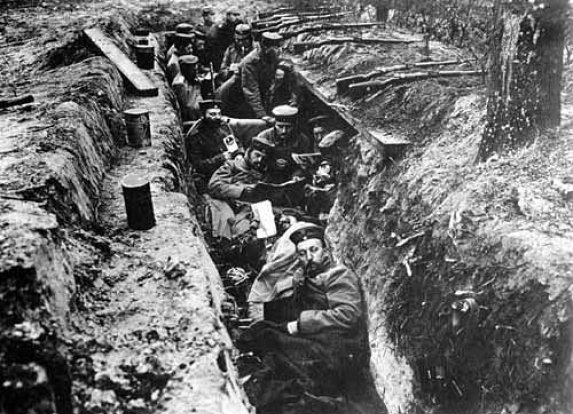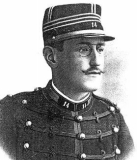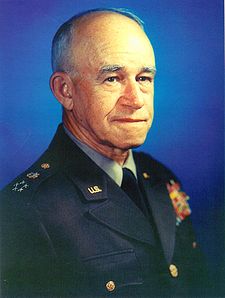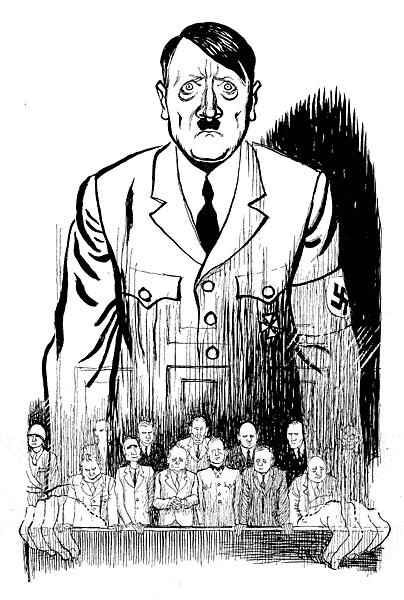
July 12
1915 World War I: Allied attack on Achi Baba:
Allied forces make a sixth and final attempt to capture Achi Baba, a prominent hill position featuring a commanding view of Cape Helles, on the Gallipoli Peninsula, from its Turkish defenders . . . .
Yet again, the Allies were unsuccessful, gaining a total of only 350 yards over two days of heavy fighting before Hunter-Weston called off the attacks. The Allied casualty figure: 4,000 dead or wounded, was lower than the Turkish one: some 10,000 men; but Achi Baba remained in Turkish hands. From then on, the bulk of Allied operations in Gallipoli were focused further north, around the so-called Anzac Cove (named for the Australia and New Zealand Army Corps) and Suvla Bay.

1915 World War I: List Regiment: Gefreiter Adolf Hitler's 16 Reserve Infantry Regiment continues to occupy a position at Fromelles, on a level field with water channels, willow trees and willow stalks. In the distance towards the enemy lines lies an insignificant wood with barbed wire entanglements. Under the direction of their defense-minded commander, Lieutenant General Gustav Scanzoni von Lichtenfels, the regiment works ceaselessly day and night to further fortify their position at Fromelles while fighting off repeated assaults by the enemy. [For further details, Click here.]
1916 World War I: List Regiment: Gefreiter Adolf Hitler endures trench warfare in Flanders (Artois) with 3 Company, 16 Reserve Infantry Regiment. [For further details, Click here.]
1917 World War I: List Regiment: Gefreiter Adolf Hitler's 16th RIR remain deployed for Phase 1 operations in Flanders, Belgium. [For further details, Click here.]
1920 Lithuania: The Soviet-Lithuanian Peace Treaty is signed, with Soviet Russia agreeing to recognize an independent Lithuania. [For further information, click here.]
1933 Holocaust: Germany blocks the bank accounts of all German-Jewish relief agencies.
1934 Belgium: All uniformed political parties are outlawed.

1935 Death: Alfred Dreyfus: French-Jewish officer best known for being the focus of the Dreyfus affair.
1938 Holocaust: Sachsenhausen concentration camp is opened:
On July 12th, 1938, the first barrack of the camp was built by 50 inmates transferred from Esterwegen. In August and September 1938, 900 inmates were once again transferred from Esterwegen to Sachsenhausen in order to take part in the construction of the camp. Due to the lack of food and the incredible cruelties of the SS, most of them died during this period. End of September, the "Konzentrazions Lager Sachsenhausen" was ready and the first political prisoners arrived in the camp.
1939 Various:

Danzig: Neville Chamberlain tells the House of Commons that: "The present status of Danzig could not be considered as illegal or unjust . . . . We hope that the Free City will prove once more that different nationalities can collaborate when their interests demand it."
Counselor of German Embassy in the USSR (Tippelskirch) to German Ambassador (Schulenburg):
Herr Lamla (Of the staff of the German Embassy in Moscow.), whom I asked to remember me to you, has probably already told you a few things. However, I still would like to report on my impressions here. The Reich Foreign Minister was busy with the Bulgarian state visit and was not able to see me. Otherwise, however, with the exception of Gaus and Selchow, who were on vacation I have talked to all personalities concerned. The State Secretary was interested to hear an opinion as to what result the English-French-Soviet pact negotiations would have. He said that he could not imagine that the Soviet Union after having entered the negotiations would let them pass without result and sink back into isolation. He was also interested in your conversations with Molotov and remarked that in his opinion our side had done enough politically for the moment.
Then we discussed the instructions concerning the answer to Mikoyan, and I expressed myself as in favor of giving this information. (The instructions were submitted to the Fuehrer by the Reich Foreign Minister and were dispatched after details had been added by the State Secretary.) The State Secretary believed that we might try to make some progress in the field of economics, but slowly, and step by step. The State Secretary apparently did not want to go further into the subject of the "Berlin Treaty"; he asked about the result of the discussion with Molotov on this point. I referred to your second telegram and said that you had only touched upon the topic. My vacation appeared to him a little bit long! I shall therefore be back at the beginning of August. Herr Schnurre was not in a very good mood. He stressed repeatedly that without any positive reaction by Molotov it would be difficult to make any progress. He showed me an order of the Fuehrer he had received by telephone on June 30 according to which further activities in Moscow were to be stopped in view of the conduct of the Russians. Thereupon, Schnurre drafted a memorandum and the order. I told him that the Embassy and particularly you, yourself, had done everything possible, but we could not drag Molotov and Mikoyan through the Brandenburger Tor.
Unfortunately, I stayed with Woermann only a short time, because the State Secretary called for me. He considered it as important that the Soviets, through Astakhov, had taken the initiative for the rapprochement. I did not deny that, but I called attention to the Fournier despatch published by the Temps about the negative statement of the Soviet Embassy here, which had escaped him. Incidentally, he made an interesting remark about the Berlin Treaty which makes it appear advisable not to touch upon the topic again without instructions. More details orally! I have talked with Schliep about the Komsomol people and caused him to have further steps taken now for the removal [die Abbefoerderung]. Of course, we conferred with everyone else concerned, including Meyer-Heydenhagen. I have also roused Herr Schwendemann against the Komsomol people.
Then I discussed with Braun Stumm (since Dr. Schmidt was not available) everything concerning the press in the sense of your letter to Seibert which, incidentally, Schmidt still had, and it fell on fertile ground. In the Personnel Division I talked with Herren Kriebel, Schroeder, Dienstmann, Dittmann. In accordance with your instructions I expressed myself as against either one of us being reassigned.
According to my impressions the problem of the Soviet Union is still of the greatest interest here. The opinions, however, fluctuate and are undecided. The formation of a definite political opinion has not yet materialized. Tonight I am going to Badgastein, Hotel Kaiserhof. With most cordial regards I remain, my dear Ambassador, yours most respectfully, Heil Hitler.
1940 World War II: The Luftwaffe carries out raids on Aberdeen in Scotland and Cardiff in Wales.
1941 World War II: Various:
The Soviet-British Mutual Assistance Pact is signed:
(1) The two Governments mutually undertake to render each other assistance and support of all kinds in the present war against Hitlerite Germany.
(2) They further undertake that during this war they will neither negotiate nor conclude an armistice or treaty of peace except by mutual agreement.
Vichy: The last Vichy French troops in Syria surrender to British and Free French forces. Great Britain and the Soviet Union sign a Mutual Assistance Pact declaring that neither state will make a separate peace with the Axis Powers.
Moscow is bombed for the first time:
By July 1941, Army Group Center had managed to encircle several Soviet armies near Minsk during the Battle of Bialystok-Minsk, creating a huge breach in Soviet lines, one that the Soviets couldn't immediately fill, as no reserves were available; and destroying the Soviet Western Front as an organized force. Thus, the Wehrmacht was able to cross the Dnieper river, which barred the path to Moscow, with only minimal casualties . . . .
1942 World War II: Various:

General Andrey Andreyevich Vlasov—who had been awarded the Order of the Red Banner for his successful defense of Moscow against von Bock's Army Group Center and was one of Stalin's favorite generals—is captured by the Germans. Vlasov soon begins to raise an army from among the Russian POWs to fight alongside the Germans against Stalin. Formed in spite of Hitler's opposition, it is named the Russian Army of Liberation. (THP)
Stalingrad: The Soviet Stavka (Red Army High Command) establishes a Stalingrad Front under Marshal Timoshenko.
Leningrad: On the Leningrad front, troops of Heeresgruppe Nord complete the reduction of the Volchov pocket, taking 30,000 Soviet prisoners, including General Vlasov, CO of the Second Guards Army and later to become C-in-C of the anti-Bolshevik Russian Liberation Army.
1943 World War II: Various:
Russians halt German advance in a decisive battle at Kursk:
On this day in 1943, one of the greatest clashes of armor in military history takes place as the German offensive against the Russian fortification at Kursk, a Russian railway and industrial center, is stopped in a devastating battle, marking the turning point in the Eastern front in the Russians' favor.
The Germans had been driven from Kursk, a key communications center between north and south, back in February. By March, the Russians had created a salient, a defensive fortification, just west of Kursk in order to prevent another attempt by the Germans to advance farther south in Russia. In June, the German invaders launched an air attack against Kursk; on the ground, Operation Cottbus was launched, ostensibly dedicated to destroying Russian partisan activity, but in reality resulting in the wholesale slaughter of Russian civilians, among whom Soviet partisan fighters had been hiding. The Russians responded with air raids against German troop formations.
By July, Hitler realized that the breaking of the Russian resistance at Kursk was essential to pursuing his aims in Soviet Russia and the defense of Greater Germany, that is, German-occupied territory outside prewar German borders. "This day, you are to take part in an offensive of such importance that the whole future of the war may depend on its outcome," Hitler announced to his soldiers on July 4. But on July 5, the Russians pulled the rug out from under Hitler's offensive by launching their own artillery bombardment. The Germans counterattacked, and the largest tank battle in history began: Between the two assailants, 6,000 tanks were deployed. On July 12, 900 Russian tanks clashed with 900 German (including their superior Tiger tanks) at Prokhorovka, the Battle of Kursk's most serious engagement. When it was all over, 300 German tanks, and even more Russian ones, were strewn over the battlefield. "The earth was black and scorched with tanks like burning torches," reported one Russian officer. But the Russians had stopped the German advance dead in its tracks. The advantage had passed to the East. The Germans' stay in Soviet territory was coming to an end.
[See: What Were Adolf Hitler's Major Blunders?]Poland July 12-13: German police and Army units kill all 200 villagers of Michniow, including babies and expectant mothers, herding Poles into buildings and burning them alive, in retribution for their assistance helping a Jewish partisan unit.

1944 World War II: In the West, the US First Army (Bradley) advancing South from the Carentan area toward St. Lo is slowly gaining ground against fierce resistance by the German 7 Armee (Dollmann).
1945 Death: Wolfram von Richthofen: German field marshal: At the time of the Battle of Stalingrad, Hitler was assured by Field Marshall Hermann Goering that the Luftwaffe could supply the Sixth Army by air, and as a result, Hitler denied the request of Field Marshall Friedrich Paulus to retreat from the city. Wolfram von Richthofen, then head of the 4th Air Fleet (Luftflotte 4), tried in vain to overturn this decision to try to supply the entire German Sixth Army by air, without success. He was a distant cousin of the German World War One flying aces, the siblings Manfred von Richthofen, who was known as the Red Baron and had shot down 80 enemy aircraft before being killed in action in 1918 and his younger brother Lothar von Richthofen who shot down 40 enemy aircraft.

1946 Nuremberg Tribunal: Defense summations continue in the Major War Criminals Trial. One point in common with nearly all of the arguments of the various Defense Counsel is that there is a major absence among the Defendants; Adolf Hitler himself.
Dr. Hanns Marx (Counsel for Defendant Julius Streicher):Up to 1937 the existence of a plan for a war of aggression was in no way recognizable. In any case, if Hitler had had any intentions in that direction, he did not allow them to be recognized from the outside. If, however, anybody had been taken into his confidence at that time, it would have been the leading men in politics and the Armed Forces, who belonged to the closest circle around him. To those, however, the Defendant Streicher by no means belonged. It is especially significant here that at the outbreak of the war Streicher was not even appointed Wehrkreiskommissar (Commissioner of Military Administrative Headquarters) of his Gau. The individual conferences from which the Prosecution derives the evidence for the planning of the war which broke out later in no case ever saw the Defendant Streicher as participant. His name does not appear anywhere, neither in any written decree, nor in any minutes. Consequently no proof has been offered that Streicher knew of such alleged plans for waging war. This does away with the accusation that he preached hatred against the Jews in order to facilitate thereby the conduct of the war planned for some later time.
Dr. Fritz Sauter (Counsel for Defendant Walter Funk):All the facts I have mentioned form a clear indication that Funk knew nothing of Hitler's intentions with regard to foreign policy, and that he had no knowledge whatsoever of the fact that Hitler was planning wars of aggression. In the summer of 1939 Funk certainly devoted particular attention to the conversion of German economy from a peacetime to a wartime basis. But as an official of the Reich, Funk considered it to be not only his right but also his duty to prepare the German people for a defensive war and to take the necessary economic measures.
However, the Prosecution believes that it can eliminate all these doubts by describing the Reichsregierung or the National Socialist Party as a criminal organization which conspired against other nations, and whose sole task was to plan and wage wars of aggression, to subjugate and enslave foreign nations, and to plunder and Germanize other countries. This deduction is erroneous, since those plans were devised and executed only by Hitler himself and a few of the men closest to him, of the type of Goebbels, Himmler, and Bormann. According to the evidence we have heard, there can be no doubt that even the highest officials of the State and the Armed Forces-and in particular Funk-were not informed of these plans, but that these plans were concealed from them by a cunning system of secrecy.
1962 Spandau Prison: From Spandau: The Secret Diaries, by Albert Speer:
In the Frankfurter Allgemeine the Schirach family announces the engagement of one of their sons. Our fellow prisoner signs his name Baldur Benedict von Schirach. Hess comments, "Schirach told me that all male descendants of the family have received the name Benedict for ever and ever; all females are named Benedicta." Then he adds sarcastically, "Did you know that? In the past he withheld from us this Catholic appendage to the Aryan Baldur." (Speer II)
1990 Soviet Union: Yeltsin resigns from Communist Party: Just two days after Mikhail Gorbachev was re-elected head of the Soviet Communist Party, Boris Yeltsin, president of the Republic of Russia, announces his resignation from the Party. Yeltsin's action was a serious blow to Gorbachev's efforts to keep the struggling Soviet Union together. [For further information, click here.]
Edited by Levi Bookin (Copy editor) Click to join 3rdReichStudies Disclaimer: This site includes diverse and controversial materials—such as excerpts from the writings of racists and anti-Semites—so that its readers can learn the nature and extent of hate and anti-Semitic discourse. It is our sincere belief that only the informed citizen can prevail over the ignorance of Racialist "thought." Far from approving these writings, this site condemns racism in all of its forms and manifestations.
levi.bookin@gmail.com










Fair Use Notice: This site may contain copyrighted material the use of which has not always been specifically authorized by the copyright owner. We are making such material available in our efforts to advance understanding of historical, political, human rights, economic, democracy, scientific, environmental, and social justice issues, etc. We believe this constitutes a "fair use" of any such copyrighted material as provided for in section 107 of the US Copyright Law. In accordance with Title 17 U.S.C. Section 107, the material on this site is distributed without profit to those who have expressed a prior interest in receiving the included information for research and educational purposes. If you wish to use copyrighted material from this site for purposes of your own that go beyond 'fair use', you must obtain permission from the copyright owner.
Please Note: The list-owner and moderators of 3rdReichStudies are not responsible for, and do not necessarily approve of, the random ads placed on our pages by our web server. They are, unfortunately, the price one pays for a 'free' website.



